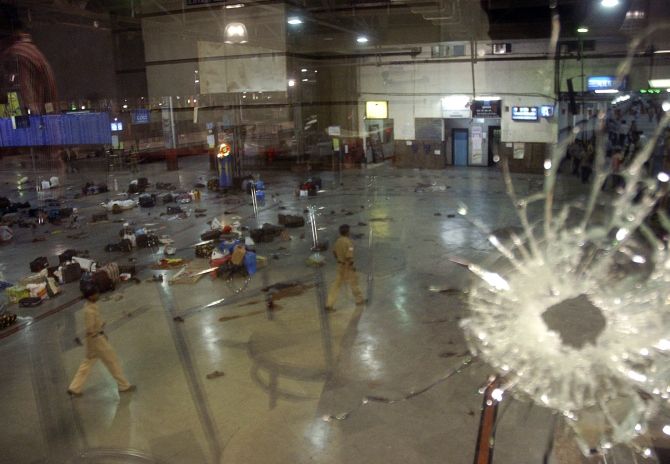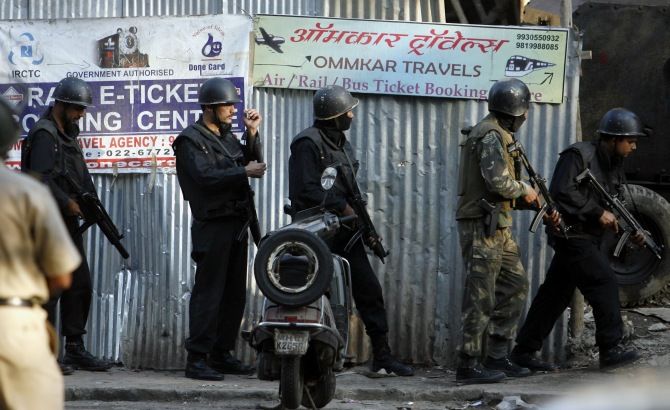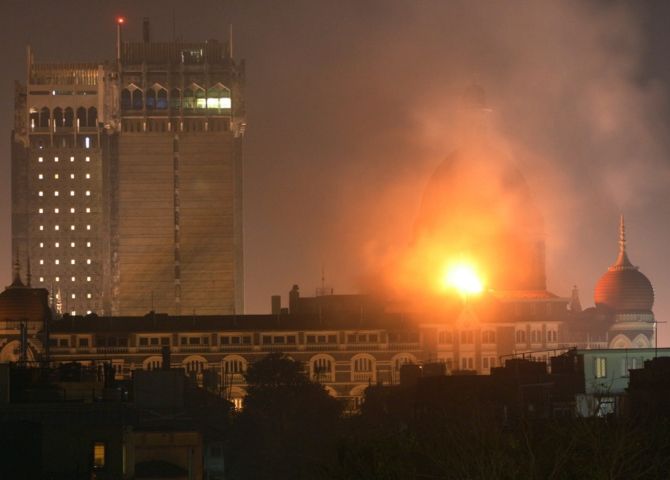'India simply wasn't prepared for the fact that a natural-born American could be organising a major terror plot in their country. And they didn't look for people like him.'
'Headley is one of the most complex and interesting terrorists of the last many years.'
Danish investigative journalist Kaare Sørensen has covered international affairs, Islamic terrorism, surveillance, intelligence agencies and subsequently the foiled Copenhagen/Aarhus 2009-2010 attack.
The journalist journeyed to Pakistan, Yemen, Iran and Egypt, spent more than 1,000 hours over a little less than four years working on his book, The Mind of A Terrorist: David Headley, the Mumbai Massacre, and His European Revenge, which traces the crimes and life of the diabolic Pakistani-American terrorist David Headley.
In the concluding part of his interview to Rediff.com's Vaihayasi Pande Daniel, Sørensen explains why David Headley is one of his dangerous kind.

May I ask the identity of the fisherman who sailed with David Headley while he was doing a recce of Mumbai harbour? What were some of the new pieces of information or people that had not been written about before, that you uncovered while writing this book?
(Much) of the information in the book comes from very open sources -- such as the trials in Chicago (of Tahawwur Hussain) Rana and Headley.
And a lot of information is gathered, through the years, from good colleagues and other journalists from around the world working with this case.
(With regard to) some of this information it is possible to be very open about (its source) and share in detail. Other information I can't go into detail about. This also applies to the fisherman.
Was it incredibly difficult to get your hands on the transcript of conversations between the handlers of the 10 terrorists? And also the conversations in Pakistan between Headley and the people he met? What pieces of information were the hardest to locate?
This is an important thing for me: None of the parts of the book are fictionalised in any way. It's all build on solid information gathered through the years and combined in the book. If any mistakes should be found, I as a writer will take the full responsibility for that, but nothing is fictionalised.
Many of the conversations are compiled from Headley's statements during the trial, but much of it also comes from several interviews.
The transcripts between the handlers and the 10 terrorists have -- in part -- been published before.
Headley had a crucial role in the 26/11 Mumbai massacre. But does a book on him glorify him, maybe more that one needs? Why go into a filthy mind such as his?
I don't think the book in any way glorifies Headley. It lays out his actions and people can judge for themselves. I presume that most people will judge Headley harshly for his role in the Mumbai attack.
And I think -- not everybody needs to agree -- but I think, that the most important thing we can do today is to understand the nature of terrorism and as such (of) the terrorist.
Why do they do it? Why do they target civilians directly?

Why do you say he is special, compared with other terrorists?
Headley is special in many ways.
For a start: He is an American citizen by birth. We don't find many of those.
Also: He was caught alive. That generally doesn't happen either. He got access to some pretty important people.
And then last, but not least: He talked about all his former friends in the different organisations.
Add all this together and you will find that Headley is indeed very special. And from him -- and his e-mails, the recordings, the evidence -- we can learn a lot about modern-day terrorism.
Was he a fascinating criminal to research?
I do believe that Headley is one of the most complex and interesting terrorists of the last many years. We don't see many of his type.

Your book mildly places Indian authorities in a not very good light. There is no doubt they were inept in their handling of the situation. What were the strongest few indicators of that in your view?
I think India simply wasn't prepared for the fact that a natural-born American could be organising a major terror plot in their country. And they didn't look for people like him.
So Headley had access to places all over India, and his cover story made that possible.
Also, it seems to me that India needed a chain of command that could stop these attacks much, much, much faster than they did.
It took almost three days to end the attack.
It is probably the longest terror attack in modern history.
The attack in Denmark never happened, as your book outlines, because Headley got caught. I also feel that had he not been caught he would never have been able to repeat a Mumbai in Denmark.
The chaos of Mumbai, and the subsequent chaos surrounding the attack, since its containment was mishandled by the authorities, made Mumbai a plum target and a place to really cause widespread damage and killings. What do you feel?
I think you are right. It is probably unlikely that an attack in Copenhagen planned by Headley would have created this much chaos and so many deaths.
But you can't rule anything out. Look at the attacks in Paris in November 2015, where 130 people got killed. Europe does have efficient police forces. But terrorists are directly targetting places with many civilians. The police have a difficult job to do.
You quote Headley in your book saying that Islam cannot be a part of an American entertainment programme. What is your personal take?
It's not possible to talk about the 'Danish stand on the Mohammed cartoons' as there are many different views.
I have never personally taken a public view on the Mohammed cartoons as I feel this would interfere with my job as a journalist covering this case. My point of view is not (of interest), it would only serve as a distraction.
I will say, however, that it is a long Danish tradition to make funny cartoons of everything. Our Queen, Jesus, famous politicians, everything is subject to being made fun of.
Don't you think that can become dangerous when it is about a less familiar society, whose threshold of insult we don't know or understand and about a less free society?
As I said: I don't have a public opinion on the drawing of these cartoons. I'm simply not interested in that specific discussion.
Just note that the cartoons were not printed for the world to see. They were printed in a Danish newspaper for Danish readers in a Danish context. As every national newspaper is all over the world.
So the intent of the newspaper was not to show these drawings to all the Muslims of the world. But to show them to the Danes and Muslims living in Denmark.
I don't think a newspaper in Lebanon thinks a lot about (whether) they are hurt feelings in Denmark, when they do their stories, and I'm not sure that a Danish newspaper should think about (whether) they are hurt feelings in Lebanon.
That the cartoons became a global phenomenon was due to the work of a group of radical Muslims in Denmark that travelled to the Middle East and asked for help to condemn these cartoons. Several of them later regretted that they took this trip.






 © 2025
© 2025